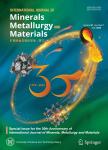Novel Au nanoparticles-inlaid titanium paper for PEM water electrolysis with enhanced interfacial electrical conductivity
Novel Au nanoparticles-inlaid titanium paper for PEM water electrolysis with enhanced interfacial electrical conductivity作者机构:State Key Laboratory of Advanced MetallurgyUniversity of Science and Technology BeijingBeijing 100083China School of Metallurgical and Ecological EngineeringUniversity of Science and Technology BeijingBeijing 100083China Department of Energy Storage Science and EngineeringSchool of Metallurgical and Ecological EngineeringUniversity of Science and Technology BeijingBeijing 100083China School of Physics and EngineeringHenan University of Science and TechnologyLuoyang 471023China
出 版 物:《International Journal of Minerals,Metallurgy and Materials》 (矿物冶金与材料学报(英文版))
年 卷 期:2022年第29卷第5期
页 面:1090-1098页
核心收录:
学科分类:081702[工学-化学工艺] 08[工学] 0817[工学-化学工程与技术]
基 金:supported by the National Key Research and Development Program of China(No.2018 YFB1502403)
主 题:water electrolysis proton-exchange membrane hydrogen energy titanium paper diffusion layer Au nanoparticles inlaid titanium gold–polydopamine nanocomposite
摘 要:Proton-exchange membrane water electrolysis(PEM WE)is a particularly promising technology for renewable hydrogen ***,the excessive passivation of the gas diffusion layer(GDL)will seriously affect the high surface-contact resistance and result in energy ***,a mechanism for improving the conductivity and interface stability of the GDL is an urgent *** this work,we have prepared a hydrophilic and corrosion resistant conductive composite protective *** polydopamine(PDA)film on the Ti surface,which was obtained via the solution oxidation method,ensured that neither micropores nor pinholes existed in the final hybrid ***-situ reduced gold nanoparticles(AuNPs)improved the conductivity to achieve the desired interfacial contact resistance and further enhanced the corrosion *** surface composition of the treated samples was investigated using scanning electron microscopy(SEM),transmis-sion electron microscopy(TEM),X-ray diffraction(XRD),and Fourier transform infrared spectroscopy(FTIR).The results indicated that the optimized reaction conditions included a pH value of 3 of HAuCl_(4) solution with PDA deposition(48 h)on papers and revealed the lowest con-tact resistance(0.5 mΩ·cm^(2))and corrosion resistance(0.001μA·cm^(−2))in a 0.5 M H_(2)SO_(4)+2 ppm F−solution(1.7 V ***)among all the modified specimens,where RHE represents reversible hydrogen *** findings indicated that the Au-PDA coating is very appropriate for the modification of Ti GDLs in PEM WE systems.



